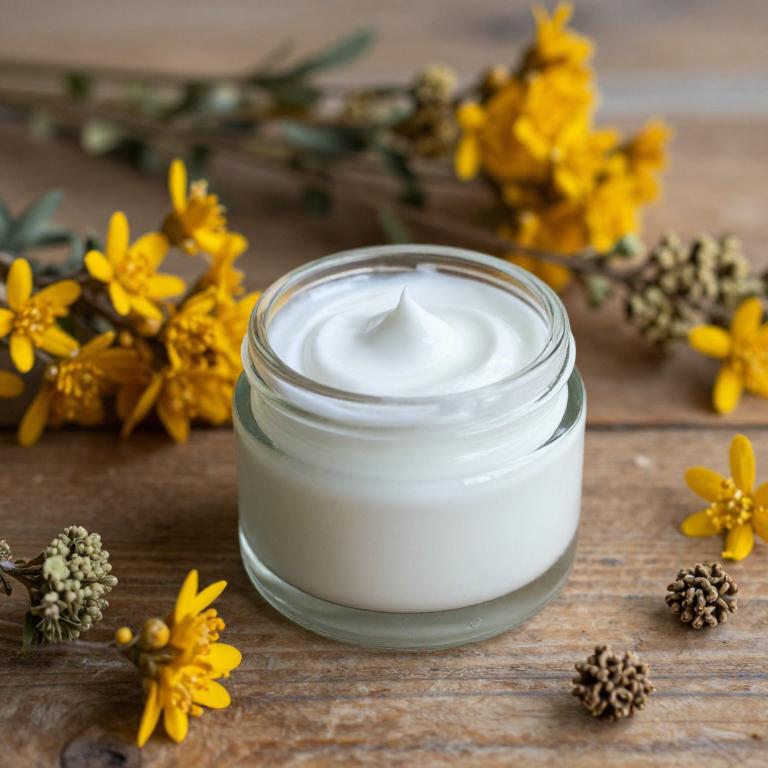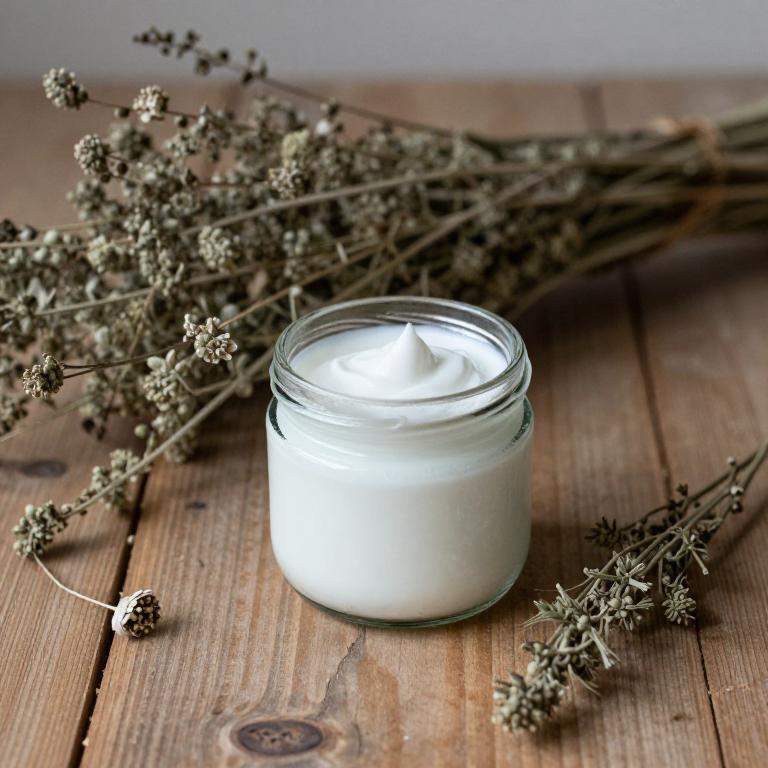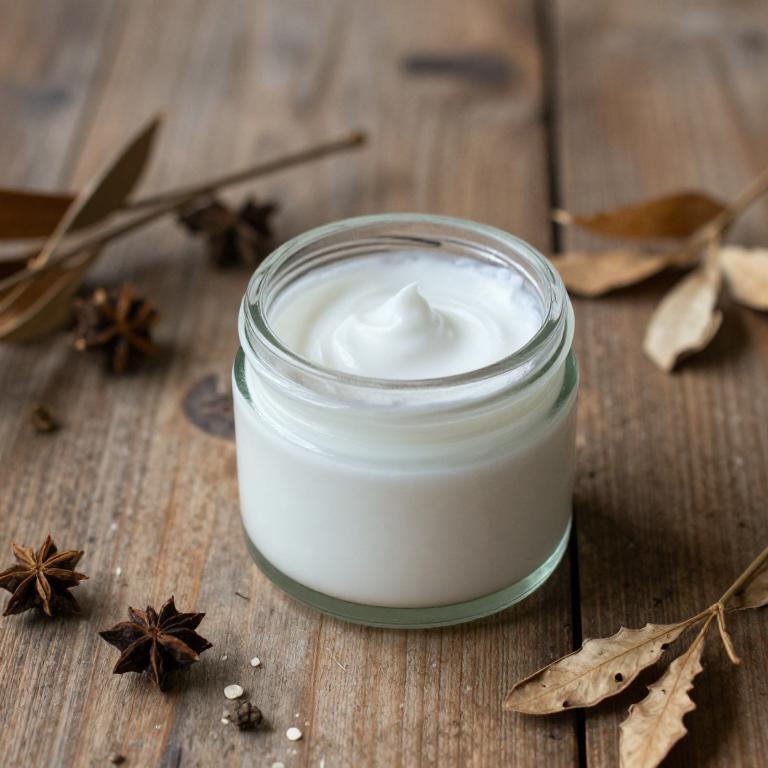10 Best Herbal Creams For Nail Fungus

Herbal creams for nail fungus are natural remedies that use plant-based ingredients such as tea tree oil, garlic, and calendula to combat fungal infections.
These creams are often preferred by individuals seeking alternatives to traditional antifungal medications due to their potentially fewer side effects. Many herbal formulations work by inhibiting fungal growth and promoting the healing of infected nails through antiseptic and anti-inflammatory properties. While they may not be as potent as prescription treatments, they can be effective for mild cases when used consistently.
However, it is important to consult a healthcare professional to determine the appropriate treatment for severe or persistent nail fungus.
Table of Contents
- 1. Polium germander (Teucrium polium)
- 2. Aloe vera (Aloe barbadensis)
- 3. Stinging nettle (Urtica dioica)
- 4. Rosemary (Rosmarinus officinalis)
- 5. English lavender (Lavandula angustifolia)
- 6. Field horsetail (Equisetum arvense)
- 7. Ginger (Zingiber officinale)
- 8. Ceylon cinnamon (Cinnamomum zeylanicum)
- 9. St. john's wort (Hypericum perforatum)
- 10. Blessed thistle (Cnicus benedictus)
1. Polium germander (Teucrium polium)

Teucrium polium, also known as summer sweet or catmint, has been traditionally used in herbal medicine for its antifungal and anti-inflammatory properties.
Herbal creams containing Teucrium polium extract are increasingly being explored as a natural alternative for treating nail fungus, which is a common and often stubborn fungal infection. These creams are believed to work by inhibiting the growth of fungi while also soothing the surrounding skin and reducing inflammation. Due to their gentle formulation, they may be suitable for individuals seeking non-toxic, plant-based treatments.
However, it is important to consult a healthcare professional before using these creams, especially if the infection is severe or persistent.
2. Aloe vera (Aloe barbadensis)

Aloe barbadensis, commonly known as aloe vera, is often incorporated into herbal creams for its soothing and antimicrobial properties.
These creams are designed to help treat nail fungus by reducing inflammation and promoting the healing of infected nail beds. Aloe vera contains compounds like aloin and polysaccharides that may inhibit the growth of fungi and support skin regeneration. While some users report improvement in nail appearance and reduced fungal symptoms, scientific evidence on its effectiveness against nail fungus remains limited.
As with any topical treatment, it is advisable to consult a healthcare professional for proper diagnosis and treatment options.
3. Stinging nettle (Urtica dioica)

Urtica dioica, commonly known as stinging nettle, is a plant that has been traditionally used for its medicinal properties, including its potential benefits in treating nail fungus.
Herbal creams containing Urtica dioica extract are formulated to support the healing of fungal infections by leveraging the plant's anti-inflammatory and antifungal properties. These creams may help reduce the symptoms of nail fungus, such as thickening, discoloration, and odor, by inhibiting the growth of fungi. However, it is important to consult a healthcare professional before using these products, as they may not be a substitute for conventional antifungal treatments.
While some users report positive results, the effectiveness of Urtica dioica creams can vary, and more scientific research is needed to fully validate their efficacy.
4. Rosemary (Rosmarinus officinalis)

Rosmarinus officinalis, commonly known as rosemary, is a herb often used in natural remedies due to its antimicrobial and antifungal properties.
Rosemary essential oil, derived from the leaves of this plant, has been shown to inhibit the growth of fungi, making it a potential ingredient in herbal creams for nail fungus. These creams typically combine rosemary oil with other natural components like tea tree oil or coconut oil to enhance their effectiveness. When applied regularly, rosemary-based creams may help reduce the symptoms of nail fungus and promote healthier nail growth.
However, it is important to consult a healthcare professional before using these creams, especially if the infection is severe or persistent.
5. English lavender (Lavandula angustifolia)

Lavandula angustifolia, commonly known as English lavender, is often incorporated into herbal creams for its antifungal and soothing properties.
These creams typically combine lavender essential oil with other natural ingredients like tea tree oil or calendula to enhance their effectiveness against nail fungus. The antifungal compounds in lavender help inhibit the growth of fungi that cause infections, making it a popular alternative to conventional treatments. Many users report reduced symptoms such as itching and discoloration when using lavender-based creams consistently.
However, it is important to consult a healthcare professional for persistent or severe cases to ensure proper treatment and management.
6. Field horsetail (Equisetum arvense)

Equisetum arvense, commonly known as horsetail, is a plant rich in silica and other minerals that may support nail health.
Herbal creams containing Equisetum arvense are often used as natural remedies for nail fungus due to their potential antifungal and regenerative properties. These creams may help strengthen nails and reduce the appearance of fungal infections by promoting tissue repair and inhibiting fungal growth. However, their effectiveness can vary, and they should not replace medical treatments for severe cases.
It is advisable to consult a healthcare professional before using such products, especially if the infection is persistent or widespread.
7. Ginger (Zingiber officinale)

Zingiber officinale, commonly known as ginger, has been traditionally used for its anti-inflammatory and antimicrobial properties, and recent studies suggest it may be effective in treating nail fungus.
Herbal creams containing zingiber officinale can help reduce the infection by inhibiting the growth of fungal organisms that cause onychomycosis. These natural remedies are often preferred by individuals seeking alternatives to conventional antifungal treatments due to their mild side effect profile. Application of ginger-based creams typically involves daily use over several weeks to see noticeable improvement in nail health.
While they may not completely replace prescription treatments, ginger herbal creams can be a beneficial complementary therapy for managing nail fungus.
8. Ceylon cinnamon (Cinnamomum zeylanicum)

Cinnamomum zeylanicum, commonly known as cinnamon, is a natural ingredient often used in herbal creams for treating nail fungus due to its antifungal and anti-inflammatory properties.
These creams typically combine cinnamon oil with other essential oils like tea tree oil to enhance their effectiveness against fungal infections. The active compounds in cinnamon, such as cinnamaldehyde, help inhibit the growth of fungi that cause nail infections. When applied topically, these herbal creams can help reduce symptoms like discoloration, thickening, and brittleness of the nails.
However, it is advisable to consult a healthcare professional before using such remedies, especially if the infection is severe or persistent.
9. St. john's wort (Hypericum perforatum)

Hypericum perforatum, commonly known as St. John's Wort, is a herbal remedy that has been traditionally used for its anti-inflammatory and antimicrobial properties.
When formulated into a cream, it may offer potential benefits for treating nail fungus by inhibiting the growth of fungal organisms. The active compounds in hypericum perforatum, such as hyperforin and hypericin, are believed to have antifungal effects that can help reduce infection and promote nail health. However, it is important to note that while some studies suggest its efficacy, more clinical research is needed to confirm its reliability as a treatment for nail fungus.
As with any herbal remedy, it is advisable to consult a healthcare professional before using hypericum perforatum cream, especially if you are on other medications or have underlying health conditions.
10. Blessed thistle (Cnicus benedictus)

Cnicus benedictus, also known as bishop's weed, is a herbal ingredient that has been traditionally used for its antifungal and anti-inflammatory properties.
Herbal creams containing Cnicus benedictus are increasingly being used as a natural alternative to conventional antifungal treatments for nail fungus. These creams are believed to help reduce fungal growth by disrupting the cell walls of the fungi, thereby inhibiting their spread. The plant's essential oils and phytochemicals contribute to its effectiveness in treating fungal infections of the nails.
While more research is needed, many users report improved nail health and reduced symptoms when using Cnicus benedictus herbal creams consistently.